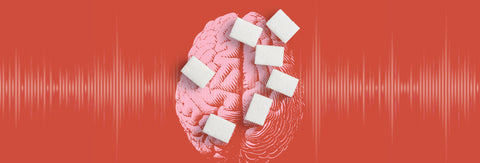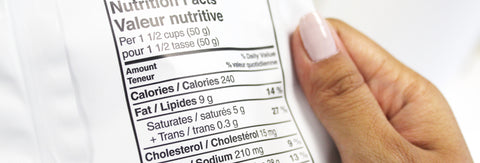Sugar: a preservative, a texturizer, a sweetener. Like salt, it elevates flavour profiles and makes foods tasty. Food just wouldn’t be the same without it. When you have too much, however, things can quickly go from sweet to sour. Excess sugar can have a severe impact on brain health, hindering both cognitive and emotional function. Let us break it down for you.
There are 3 classes of sugar, and they are all labelled “monosaccharide” (a simple carbohydrate). These are:
- Fructose, which is the fruit sugar naturally found in many plants, such as fruit, vegetables and honey.
- Galactose, the sugar found in milk and yogurt.
- Glucose, found in many carbohydrates and the source of your body’s energy. This is the most abundant monosaccharide and widely used throughout the food industry.
Through digestion, your body breaks carbohydrates down to sugars. This is used for energy. The organ in your body that requires this the most, is your brain. So, what happens to your brain on sugar?
Here’s what:
While glucose is the primary source of energy for every cell in the body, you can count on your brain to use at least half of the total sugar power your body produces. So yes, carbohydrates are crucial. A lack of it will slow your cognitive function altogether, stifling thinking, memory and learning. Neurotransmitters (your brain’s chemical messengers) will cease production, and neural communication will break down. But the trouble wouldn’t end there! In the instance of diabetic complications like hypoglycemia (a condition caused by low glucose levels), your brain would quickly power down, lose focus and function. In essence, your brain needs sugar.
Though the brain’s primary source of fuel is glucose, when exposed to it in excess, things can go awry. can also impair your brain’s cognitive functions and have a significant effect on your self-control. Sugar is addictive for most and can have the same effect on our brains as drugs. Provoking stronger, more intense feelings of hunger as they climb the glycemic scale*, studies have even found that sweet foods can be more addictive than cocaine, with more sugar needed to reach the same feeling over time.
So how much is too much?!
A 2012 study has shown a positive correlation between aging and fructose consumption. Scientists at the University of Montreal, as well as Boston College, have also identified a relationship between memory loss, cognitive deficiency and glucose consumption.
Sugar and your memory
Even a slight elevation of glucose in the brain can have a negative effect on it. Sugar consumption increases inflammation in the hippocampus, impacting memory.But all is not lost
There’s a possibility this damage is not permanent and can be reversed by following a low-sugar, or sugar-free, diet and supplementing with key nutrients. Omega-3s, such as DHA, are known to help with cognitive function and turmeric is used to reduce inflammation. A research review published in the journal Nutrients stated that “diets high in fat and sugar impair memory and are associated with decreased neurogenesis and increased inflammatory responses, DHA and curcumin [turmeric] may represent therapeutic targets in reversing cognitive deficits induced by poor diet.” Study found that reducing sugar and supplementing with omega-3 and turmeric could actually improve working memory.
Sugar and mood
Consumption of sugar also affects mood, with brain imaging studies showing healthy young people as having a diminished ability to process emotion when blood glucose levels are elevated. Higher rates of sugar consumption have also been tied to increased incidence of depression.
Uncontrolled diabetes, whether type 1 or 2, can have some severe consequences on the brain over time. People with type 2 diabetes reported increased feelings of sadness when blood sugar is elevated. High sugar levels can send your brain’s connectivity on the fritz, causing a strain on how functional properties and brain matter communicate with each other. This can cause the brain to shrink, as well as small-vessel disease, which not only restricts blood flow, but also slows cognitive function, and if severe enough, can cause the development of vascular dementia.
Sugar can also contribute to anxiety. As you rise and crash, sugar addiction can trigger attacks. When your sugar levels dip, your brain goes into survival mode in search of food. Your body begins to feel shaky, weak and confused, and as your blood sugar drops into hypoglycemia, your brain sends out adrenaline warnings that materialize as anxiety.
As the saying goes, moderation in all things – including moderation. While the occasional sweet treat may not tip the cerebral bucket, keeping an eye on intake can be the difference between sickness and health.




